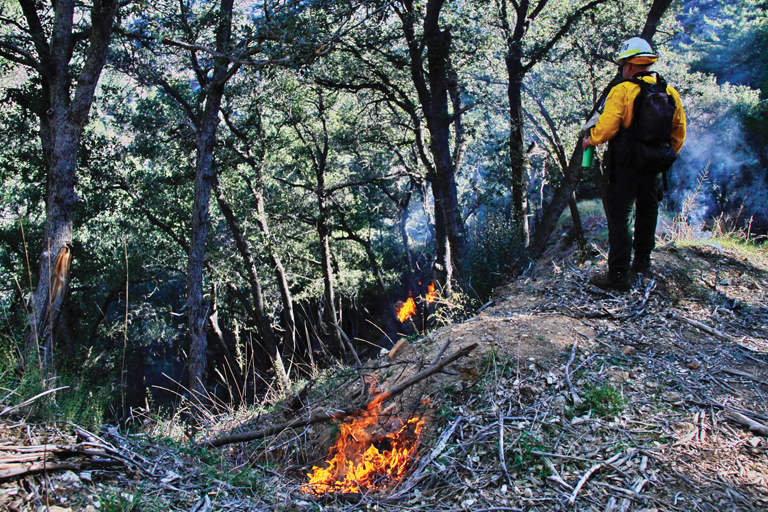
During extreme heat like that recently experienced in Southern California can result in dangerous wildfires.
By Charly SHELTON
July 6 was the hottest day ever recorded in the Crescenta Valley area, surpassing the former hottest temperature ever, 113 degrees in September 1971. And yet, with record-breaking heat, some still disregard safety practices and make poor choices. A woman was arrested Sunday, just two days after the record-heat day, for allegedly leaving her two children – a 9-month-old and 1-year-old – in her car in the parking lot of a Walmart in the Inland Empire while she shopped. Common sense can literally mean life or death for those who depend on adults, be they children or animals. Most of our pets are not adapted for this kind of heat and, even if they are, pets are slower to adapt to the elements than their wild brethren.
Wildlife lives in the elements 24-7 so they’re very adaptable to the changing weather conditions, unlike domestic pets that have the luxury of having the cool houses during the heat of the day,” said Rebecca Barboza, wildlife biologist with the Dept. of Fish and Wildlife. “That said, wildlife will reduce their activity level and will seek out shaded areas and water sources. A common misconception is that wildlife comes down from the forest to seek out urban areas during heat waves and even after fire events. In reality, the animals that people are seeing are already utilizing the urban areas; people just don’t notice them as much during optimal weather conditions when animals tend to avoid each other. They spread themselves out throughout their home ranges. And those home ranges might include portions of the forest as well as the urban-wildland interface.”
The DFW receives frequent calls asking for the removal of animals because they are in a neighborhood. But unless the animal can’t easily make it back to its natural habitat, Barboza said, the department doesn’t interfere. For example, calls in the summer are received from the foothills area that a bear has crawled under a house to take advantage of a cool crawl space or a bear is swimming in a backyard pool. Most of the time, the animal just wanders back to its home on its own.
Crescenta Valley residents are no strangers to bear visits because wildlife – bears, bobcats, coyotes, etc. – have less energy in extreme heat and shade, food and water are easier to find in an urban setting than in the woods. Their main goal is to lie still and get cool, even foregoing searching for food if it’s too hot, Barboza said. Although some residents who leave food or water out for wildlife think they’re helping, it actually does more harm than good.
“I know people have [the animals’] best interests in mind that ‘we’re gonna help this animal out by giving them food and clean water.’ But do not do that because these animals quickly associate these food rewards with humans, so leave the animals alone. If you see them, just leave them alone and they’ll make their way back to wherever they were on their way to,” Barboza said.
Another danger during extreme heat is wildfire. Just last weekend there was a fire in Burbank that necessitated evacuations of 40 homes on Country Club Drive above Sunset Canyon. Visitors were asked to leave the Wildwood Canyon and Stough Nature Center. The call came in at 1 p.m. on Saturday and Burbank Fire Dept. responded, and then was assisted by Glendale FD, LAFD, LA County FD, Pasadena FD and San Marino FD. The 45-acre fire is 90% contained as of press time.
Just as this fire was being knocked down, another sprang up at Griffith Park. That one had 100% containment in only one day but consumed 25 acres and “a few vehicles burned,” tweeted Capt. Erik Scott, LAFD PIO. All of this happened in the LA area while the West Fire raged in San Diego, consuming 65 structures and 504 acres, which led Gov. Jerry Brown to declare a state of emergency on Friday. The West Fire is 100% contained as of press time.
This is a common occurrence. When one fire dies down, another one kicks up.
“We are in wildfire season and [residents] need to be extra cautious,” said Danny Alvarez, assistant chief of the Burbank FD.
Keeping pets indoors during the heat, clearing yards of fallen fruit or other foods and closing crawl spaces to protect against bear visits are advised. People are also advised to be mindful of heat safety habits, both their own and those who depend on them. It is also important for residents to clear brush from around their home and yard to make it possible for firefighters to defend homes if they need to.
“The more clearance there is, the better opportunity firefighters have to defend those homes,” Alvarez said.
